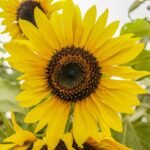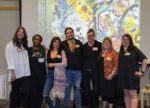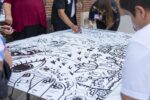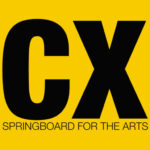Launched in 2021, The Rural Regenerator Fellowship brings together individual artists, makers, and culture bearers, grassroots organizers, community development workers, public sector workers and other rural change-makers who are committed to advancing the role of art, culture and creativity in rural development and community building.
Fellows participate in two years of peer learning and exchange, and receive an unrestricted $10,000 stipend.
Fellowship Overview
The Fellowship is a two-year commitment. The average monthly time commitment is roughly 4 hours, plus two 4-day retreats in year 1, and one 2-4 day site exchange with another Fellow (visiting each other’s community to learn more deeply about each other's work) in year two.
- Unrestricted $10,000 stipend
- Two required in-person retreats in the Fergus Falls region, October 10 - 13, 2023 and
April 23 - 26, 2024 (full travel support provided)
- Monthly virtual meetups
- Free artist career consultations
- Opportunities for artist talks, thought partnership and engagement with Springboard programs.
- $5,000 to support a site exchange or collaboration with at least one other Fellow.
- Support to attend and present at the Rural Futures Summit (date and time TBD)
- Optional 1 – 2 week solo residency in Fergus Falls for time for reflection, research, creative work, and/or project prototyping.
Tuesday, April 25, 2023 – Applications Open
Friday, May 5, 2023 - Virtual info session (12 - 1pm CST)
Tuesday, June 20, 2023– Applications Due at 11:59pm CST
Mid-August 2023 – Applicants notified of status
October 10 - 13, 2023 – Retreat #1 near Fergus Falls, MN
April 23 - 26, 2024 – Retreat # 2 near Fergus Falls, MN
October 2024 - September 2025 - Site exchanges, Rural Futures Summit, and residency
- Only individuals may apply. Organizations, collectives or other entities are not eligible.
- Applicants must be at least 21 years of age.
- Applicants must live in Minnesota, North Dakota, South Dakota, Wisconsin, Michigan, Iowa, Illinois, Kansas, or Nebraska and/or the Native Nations that share those geographies.
- Applicants must live, work or have a strong connection to a rural community (50,000 people or fewer AND more than 40 miles from a metropolitan area).
- While we know that “rural” has a broad definition and that people have multi-centered relationships with place, we will only consider applicants that currently live or work or demonstrate a strong connection to communities of 50,000 people or fewer.
- Not be a current or past Rural Regenerator Fellow. Participation in other Springboard programs, including CCLI, is ok.
- Not be an employee or board member of Springboard for the Arts (independent contractors, including current Artist Career Consultants, are eligible to apply)
- Not be an immediate family member of Springboard staff or board members
At Springboard we design our programs to be useful to as many people as possible and use competitive processes, like this Fellowship program, only when they are necessary to get resources to priority communities or to create a relevant experience for a specific group of people. Our selection process is about identifying a cohort of people who will benefit from a shared experience with each other at this moment in their work and careers, not about making judgment on the value, quality, or quantity of applicants’ work. With that in mind, these are the things we take into consideration when selecting Fellows for this program:
- Applicants should have at least 2-3 years of experience advancing the role of art, creativity, and culture in rural community development. This experience can be informal or formal.
- Applicants should demonstrate a commitment to exchange with other Fellows, both by being willing to share their knowledge and experiences, and being curious about other cohort member knowledge and experiences.
- Applicants do not need to propose a specific project, but should share a compelling vision for the impact they want to make in their rural community, and why this Fellowship is essential to help them get closer to that vision at this time in their life and career.
- People who are Black, Indigenous, Native, People of Color, LGBTQIA+, and/or People with disabilities will be prioritized in the selection process.
Our selection process consists of the following steps:
- Eligibility screening: Springboard staff will review applicants for eligibility (see above for eligibility requirements). If eligibility is unclear, staff will follow up with the applicant to determine eligibility. If an application is eliminated due to ineligibility, the applicant will be notified at this stage.
- Peer Review: A small group of rural arts and culture practitioners read all applications, and rank them according to the selection criteria listed above, then meet to determine a group of finalists (roughly 20-30% of the entire pool) to move on for further consideration.
- Cohort Selection: At this stage, the Rural Regenerator Facilitators, and 2 alumni from the RRF program make the final recommendation to Springboard staff, taking special consideration into representation of Springboard’s priority groups, geographic representation, and potential for a strong cohort experience.

The 2023-25 Rural Regenerator Fellows are Mary Knox Johnson, Keith Pilapil Lesmeister, Franciszka Voeltz, Ne-Dah-Ness Greene, Anni Zylstra, Karrie Steely, Kyle Mesteth, Courtney Bunker, Erika Nelson, Mary Ellen Jones, Andrea V. Duarte-Alonso, and Klaire A. Lockheart.

The 2022-24 Rural Regenerator Fellows are Penny Kagigebi, Wicanhpi Iyotan Win Autumn Cavender, Melissa Wray, Lyle Miller Sr., Awanigiizhik Bruce, Siricasso Garcia, Rufus Jupiter, Nancy XiáoRong Valentine, and Eliza Blue.

The 2021-23 Rural Regenerator Fellows are Alice M McGary, Amber Hansen, Annie Hough, Bethany, Lacktorin, Talon Bazille, Mai'a Williams, Molly Hassler, J Erin Hutchinson, Inkpa Mani, Sandra Kern Mollman, and Elisha Marin.

Go in-depth on the current cohort of Fellows with a series of features on Creative Exchange.
Frequently Asked Questions
While the definition is not perfect, we generally follow the USDA's definition of rural, which is a town or tribal community of fewer than 50,000 people that is ALSO at least 40 miles from a metro area*. However, this definition, like so many others, is imperfect and there is always nuance in how our communities self-identify. If your community does not fit the above parameters, but you and your community still identify with the term "rural," we encourage you make the case for this in your application.
* metro is generally defined as a city or combo of nearby cities that is 100,000 people or more.
The program is still new, but in 2021, we received 141 applications, and accepted 10 Fellows.
In 2022, 23% of applicants were BIPOC, 24% LGBTQIA+, and 33% people with disabilities. 50% of applicants were from Minnesota, and the remaining were from other eligible states in the Midwest.
You might be. We understand that people’s relationship to place is nuanced and multi-centered. Regardless of residency, each applicant will need to explain and demonstrate their commitment to and experience working in rural communities, and their resumes should reflect this experience.
Springboard’s scope is to provide infrastructure, ecosystem and support to artists and communities across Minnesota, the Upper Midwest and the nation. Springboard is for everyone. We know that to be truly “for everyone” means we need to address the recurring inequities that exist in the arts, nonprofit sector and broader economic systems that have prevented “everyone” from equitable access and opportunities. Across all our programs at Springboard for the Arts, our goal is to increase accessibility and to prioritize communities that are under-resourced. As a baseline all of Springboard’s programs prioritize: People who are BIPOC and Native, People who are LGBTQIA+, People in rural places, and People with disabilities because of the systemic extraction and marginalization these communities have experienced related to the specific resources Springboard offers. We, of course, acknowledge that there are additional communities that experience discrimination, and we do our best to make decisions about where our resources will have the most impact, knowing that this is always imperfect.
Yes, it is still possible to be selected as part of the Fellowship even if you’re not in one of the priority groups. There are many factors that go into the selection process, including but not limited to the geography you live or work in, your commitment and impact to rural communities, your commitment to working with under-resourced communities, the work you’ve done to seek out and center diverse perspectives, and the perspectives and ideas you will contribute to the group as a whole.
The Americans with Disabilities Act defines disabled as a physical or mental impairment that substantially limits one or more major life activities, a person who has a history or record of such an impairment, or a person who is perceived by others as having such an impairment.
No, this opportunity is for individuals, not organizations. Of course, you can and should share your relevant organizational work in your application, but the Fellowship is focused on your individual creative leadership journey.
The Fellowship stipend will only be distributed to individuals, with very few exceptions in extenuating or unique circumstances that will be determined after a Fellow is selected in the program.
No, we do not accept applications on behalf of teams or collectives, only individuals.
Nope! The Fellowship is not tied to a specific project you plan to do, it’s about the work you’ve already done, the impact you hope to make in the future, and your desire to connect with and learn from a network of rural practitioners.
Yes, it is taxable income, which means, if you are selected, you will want to make sure to budget for paying taxes on it when you file each year, as well as save receipts related to your Fellowship so that you can write them off (usually on your Schedule C form) when you file for taxes. Please note that Springboard staff cannot give direct tax or finance advice for specific situations. We recommend that you find a CPA in your community that can give you advice if you receive the Fellowship.
